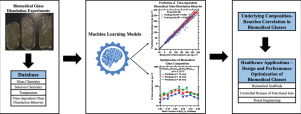当前位置:
X-MOL 学术
›
Acta Biomater.
›
论文详情
Our official English website, www.x-mol.net, welcomes your feedback! (Note: you will need to create a separate account there.)
Machine learning as a tool to design glasses with controlled dissolution for healthcare applications.
Acta Biomaterialia ( IF 9.7 ) Pub Date : 2020-02-28 , DOI: 10.1016/j.actbio.2020.02.037 Taihao Han 1 , Nicholas Stone-Weiss 2 , Jie Huang 3 , Ashutosh Goel 2 , Aditya Kumar 1
Acta Biomaterialia ( IF 9.7 ) Pub Date : 2020-02-28 , DOI: 10.1016/j.actbio.2020.02.037 Taihao Han 1 , Nicholas Stone-Weiss 2 , Jie Huang 3 , Ashutosh Goel 2 , Aditya Kumar 1
Affiliation

|
The advancement of glass science has played a pivotal role in enhancing the quality and length of human life. However, with an ever-increasing demand for glasses in a variety of healthcare applications - especially with controlled degradation rates - it is becoming difficult to design new glass compositions using conventional approaches. For example, it is difficult, if not impossible, to design new gene-activation bioactive glasses, with controlled release of functional ions tailored for specific patient states, using trial-and-error based approaches. Notwithstanding, it is possible to design new glasses with controlled release of functional ions by using artificial intelligence-based methods, for example, supervised machine learning (ML). In this paper, we present an ensemble ML model for reliable prediction of time- and composition-dependent dissolution behavior of a wide variety of oxide glasses relevant for various biomedical applications. A comprehensive database, comprising of over 1300 data-records consolidated from original glass dissolution experiments, has been used for training and subsequent testing of prediction performance of the ML model. Results demonstrate that the ensemble ML model can predict chemical degradation behavior of glasses in aqueous solutions over a wide range of pH relevant for their usage in a human body where the environment can be highly acidic (for example, pH = 3), for example, due to secretion of citric acid by osteoclasts, or highly alkaline (pH ≈10) due to the release of alkali cations from bioactive glasses. Outcomes of this study can be leveraged to design glasses with controlled dissolution behavior in various biological environments. STATEMENT OF SIGNIFICANCE: In this paper, we present an ensemble machine learning (ML) model for prediction of dissolution behavior of a wide variety of oxide glasses relevant for various biomedical applications. The results demonstrate that the ML model can predict the chemical degradation behavior of glasses in aqueous solutions over a wide range of pH relevant for their usage in a human body where the environment can be highly acidic (for example, pH = 3), for example, due to secretion of citric acid by osteoclasts, or highly alkaline (pH ≈10) due to the release of alkali cations from bioactive glasses. Outcomes of this study can be leveraged to design new biomedical glasses with controlled (desired) dissolution behavior in various biological environments.
中文翻译:

机器学习作为设计用于医疗保健应用的溶出度受控的眼镜的工具。
玻璃科学的进步在提高人类寿命和质量方面起着举足轻重的作用。然而,随着在各种医疗保健应用中对玻璃的需求不断增长,特别是在降解速率受控的情况下,使用传统方法设计新的玻璃组合物变得越来越困难。例如,使用基于反复试验的方法,要设计出能够针对特定患者状态量身定制的功能离子进行受控释放的新型基因激活生物活性玻璃,即使不是不可能,也很困难。尽管如此,仍可以通过使用基于人工智能的方法(例如,有监督的机器学习(ML))来设计具有功能性离子受控释放的新型玻璃。在本文中,我们提出了一套集成的ML模型,用于可靠预测各种生物医学应用相关的各种氧化物玻璃的时间和成分依赖性溶出行为。包含1300多个从原始玻璃溶解实验合并而来的数据记录的综合数据库已用于训练和随后测试ML模型的预测性能。结果表明,集合ML模型可以预测玻璃在水溶液中的化学降解行为,该水溶液在广泛的pH值范围内与在环境中可能为高酸性(例如pH = 3)的人体中使用有关,例如,是由于破骨细胞分泌柠檬酸引起的,或者是由于从生物活性玻璃中释放出碱性阳离子而产生的高度碱性(pH≈10)。可以利用这项研究的结果来设计在各种生物环境中具有受控溶出度的玻璃杯。意义声明:在本文中,我们提出了一种集成机器学习(ML)模型,用于预测与各种生物医学应用相关的各种氧化物玻璃的溶解行为。结果表明,ML模型可以预测玻璃在水溶液中的化学降解行为,该水溶液在很宽的pH值范围内与在环境中可能为高酸性(例如pH = 3)的人体中使用有关。 ,是由于破骨细胞分泌柠檬酸引起的,或者是由于从生物活性玻璃中释放出碱性阳离子而产生的高度碱性(pH≈10)。
更新日期:2020-02-28
中文翻译:

机器学习作为设计用于医疗保健应用的溶出度受控的眼镜的工具。
玻璃科学的进步在提高人类寿命和质量方面起着举足轻重的作用。然而,随着在各种医疗保健应用中对玻璃的需求不断增长,特别是在降解速率受控的情况下,使用传统方法设计新的玻璃组合物变得越来越困难。例如,使用基于反复试验的方法,要设计出能够针对特定患者状态量身定制的功能离子进行受控释放的新型基因激活生物活性玻璃,即使不是不可能,也很困难。尽管如此,仍可以通过使用基于人工智能的方法(例如,有监督的机器学习(ML))来设计具有功能性离子受控释放的新型玻璃。在本文中,我们提出了一套集成的ML模型,用于可靠预测各种生物医学应用相关的各种氧化物玻璃的时间和成分依赖性溶出行为。包含1300多个从原始玻璃溶解实验合并而来的数据记录的综合数据库已用于训练和随后测试ML模型的预测性能。结果表明,集合ML模型可以预测玻璃在水溶液中的化学降解行为,该水溶液在广泛的pH值范围内与在环境中可能为高酸性(例如pH = 3)的人体中使用有关,例如,是由于破骨细胞分泌柠檬酸引起的,或者是由于从生物活性玻璃中释放出碱性阳离子而产生的高度碱性(pH≈10)。可以利用这项研究的结果来设计在各种生物环境中具有受控溶出度的玻璃杯。意义声明:在本文中,我们提出了一种集成机器学习(ML)模型,用于预测与各种生物医学应用相关的各种氧化物玻璃的溶解行为。结果表明,ML模型可以预测玻璃在水溶液中的化学降解行为,该水溶液在很宽的pH值范围内与在环境中可能为高酸性(例如pH = 3)的人体中使用有关。 ,是由于破骨细胞分泌柠檬酸引起的,或者是由于从生物活性玻璃中释放出碱性阳离子而产生的高度碱性(pH≈10)。


























 京公网安备 11010802027423号
京公网安备 11010802027423号